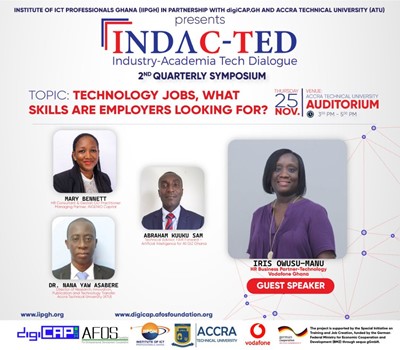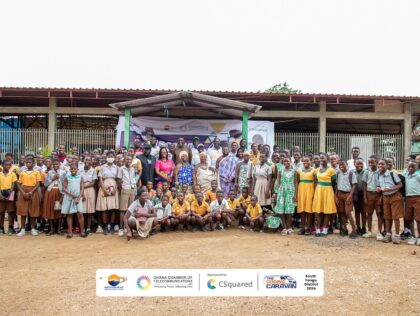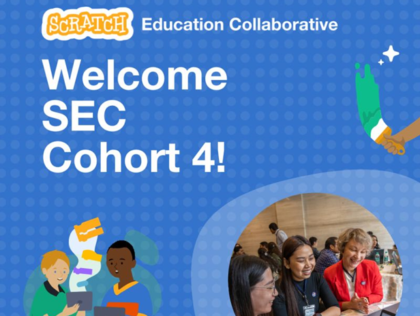“We need to reskill and upskill to remain relevant. The skills you already have. You need to re-energize it as part of the reskilling process and upskilling, meaning moving the notch higher into what new things are coming up”. These were the opening remarks of the guest speaker Madam Iris Owusu-Manu, HR Business Partner-Technology, Vodafone Ghana at the 2nd INDAC-TED symposium.
The Institute of ICT Professionals Ghana (IIPGH) in partnership with DigiCAP.gh an ICT project being financed by the German Federal Ministry for Economic Cooperation and Development organized its 2nd Industry Academia Tech Dialogue (INDAC-TED) symposium on the topic “TECHNOLOGY JOBS, WHAT SKILLS ARE EMPLOYERS LOOKING FOR?” on Thursday 25th November 2021, at the Auditorium of Accra Technical University (ATU). This quarterly symposium brings together industry players: educators, students, policymakers, regulators, among others for an industry-academia dialogue on ICT development to create job opportunities for the youth.
The DigiCAP project being implemented by AFOS Foundation from Germany targets students and facilitators in public tertiary institutions. It provides capacity building in practice-oriented ICT qualification programs as add-on measures to promote employment for young people after completion of their tertiary education programs. The University of Cape Coast (UCC) is the first beneficiary of this program and Accra Technical University (ATU) is currently in the onboarding process to become the 2nd public university to benefit from this “Invest for Employment” initiative from the Federal Republic of Germany. To foster stronger collaboration between academia and industry, the digiCAP project designed a quarterly symposium being spearheaded by the Institute of ICT Professionals Ghana, an industry association that brings together players in the ICT Ecosystem.

The symposium which was moderated by Madam Mary Ama Bawa, Broadcast Journalist, ATL FM started with a brief opening remark by Mr. David Gowu, Executive Director of IIPGH. He gave a brief background of the INDAC-TED, then explained that the objective of the symposium is to bring industry and academia together to dialogue and find a common purpose for ICT development in Ghana. The Pro-Vice-Chancellor of ATU Prof. Amevi Acakpovi in his welcome address noted that if one travels these days, one would observe that transformation in the world is numerous and most of these transformations are driven by ICT. He sighted some examples of the importance of ICT in today’s world. “These days, the mechanic needs some ICT skills to use the diagnostic device and troubleshoot faults in vehicles. Those without these skills are out of job”, he added.
Guest Speaker’s presentation

After the opening address and short statements from partners, it was time to discuss the main topic of the day: TECHNOLOGY JOBS, WHAT SKILLS ARE EMPLOYERS LOOKING FOR? As the world of work and technology evolves, roles in technology are also changing, so the key to staying relevant in this digital age is reskilling and upskilling. These remarks set the tone for Madam Iris Owusu-Manu’s insightful presentation as the guest speaker for the 2nd INDAC-TED symposium. The quarterly symposium is designed where a guest speaker is allocated sufficient time to engage participants both at the venue and online. She mentioned that young people in the university can add any technological skills to their course, which will eventually give them an advantage over others. “You are young, you can learn accounting and still learn to code, you can create things,” she emphasized. Iris shared some new roles in the technology field and encouraged the students to embrace new skills required to be prepared for these roles.

Are you Future-Ready?
The guest speaker then posed a question to the participants; “after all that you have heard and what is going on, do you think you are future-ready?”. She continued and explained that to be future-ready, one needs to be dynamic. Iris added that people must be dynamic; they must constantly reskill and upskill. They must be enthusiastic, motivated, and passionate. Finally, they must be flexible and adaptable so they can fit into roles available in this evolving technological world. The HR-Business partner then provided more insight into 14 skills for the future and encouraged the students to gain at least one skill before completing their university course. After an engaging and exciting presentation session that got the participants itching to ask questions, then came the Questions and Answers (Q&A) session. There were several questions from the audience about internship opportunities in Vodafone and employment vacancies. Subject Matter Experts (SME) from the HR department and technology took turns to answer questions from the participants.

DigiCAP Students Presentations: Data Science & Business Intelligence
After an hour of insightful presentation from the guest speaker and an engaging Q&A session, there was the need to take a break and get some practical feel of these emerging skills. The moderator, therefore, invited the Lead Facilitator of the DigiCAP project, Mr. Wendel Laryea, and his students to present some of the products and applications they have developed. Josephine Annan was the first trainee to present her project work on a Fitness Centre Retail Store. She used Jupiter notebook to analyze the profile of customers that bought their products and produced graphs to visualize her results. The second presentation from Joseph Nartey conducted a study on National Inspectorate Board, a government institution mandated to enforce the quality standards for schools in Ghana. He developed an application that digitized their processes to manage the inspection process and efficient service.
Panel Discussion: “Technology Jobs, What Skills Are Employers Looking For?
To get different perspectives on the topic, four (4) experts sat in as panels for this conversation. To set the ball rolling, one of the panelists from academia Dr. Nana Yaw Asabere, the Director of Research, Innovation, Publication, and Technology Transfer of ATU indicated that for Ghana to make an impact in what is being discussed, industry and academia must work closely together. “Education starts with academia but there must be a closer collaboration between industry and academia to ensure that what is needed by industry is included in the curriculum,” he concluded.

Mary Bennett, a global organizational learning and development consultant, and the Managing Partner, Ingenio Capital, revealed that people are taking skills learning into their own hands. She explained that according to a LinkedIn report in October, about 140 million skills have been learned. “There is also research that 150 million digital jobs will be created by 2025, but most of the graduates do not even have the soft skills and the hard skills to access those jobs,” she noted. Abraham Kuuku Sam, Technical Advisor, FAIR Forward–Artificial Intelligence for All GIZ Program, in his submission was emphatic that the future of jobs will be about three (3) areas. “There is enough research to show that the future of work will be about digitalization, automation and artificial intelligence (AI)”, he stated. He added that because things are changing fast, students must be taught how to learn, unlearn and relearn. The guest speaker, Iris Owusu-Manu, who joined as the fourth panelist added her voice, encouraging the students to develop the energy, the passion, and the enthusiasm for their career development.
Updates from German Implementation partners: AFOS and SEQUA
Before the guest speaker’s presentation, representatives from AFOS Foundation and Sequa took turns to make brief statements about their organizations and their connection to the project. Hanna Schlingmann, AFOS Ghana DigiCAP Project Manager, used the opportunity to present a brief background of AFOS Foundation for Entrepreneurial Development. The organization was formed in 2003 by the Federation of Catholic entrepreneurs to promote capacity building, empowerment, and economic growth.

In Ghana, the organization is leading the DigiCAP (Digital Capacity) project implementation with other partners, namely: University of Cape Coast (UCC), Institute of ICT Professionals Ghana (IIPGH), and Accra Technical University (ATU). “To summarize, there are three (3) highlights from the digiCAP project: we are excited to have Accra Technical University (ATU) as a new partner and we are looking forward to starting qualification programs for lecturers and students. Second, the Students’ DigiCAP Junior Consultancy Program, where the first batch of students who completed the DigiCAP program, shall put their skills to work. Third, we are looking forward to our next INDAC-TED which will be combined with a Job Fair in February 2022,” she concluded.
Nawal Schmitz, a representative of Sequa from Germany, also mounted the podium to address the participants. She explained Sequa is the implementing organization of the German Federal Ministry of Economic Cooperation and Development, also referred to as BMZ. “Sequa is the program coordinator on behalf of BMZ and provides project management functions of the entire project,” Ms. Schmitz explained. She revealed Sequa managed over 1,500 projects in over 100 countries, German government agencies, and European Union (EU).

After an engaging and thought-provoking statement from the experts, it was time to draw the curtains to another successful industry-academia tech dialogue. Mr. Richard Kafui Amanfu delivered the closing remarks to summarize the day’s dialogue.
He reiterated the commitment of the Institute of ICT Professionals Ghana and its partners to continue this industry engagement with academia. “We intend to take this program across the country and we encourage other stakeholders to come on board so we make INDAC-TED the voice of the industry and a platform to connect with academia,” he concluded. The program ended with an informal networking and interactive session between the speakers and the participants at the venue.
Author: David Gowu–(Executive Director, Institute of ICT Professionals, Ghana)
For comments, contact david.gowu@iipgh.org or Mobile: +233242773762





